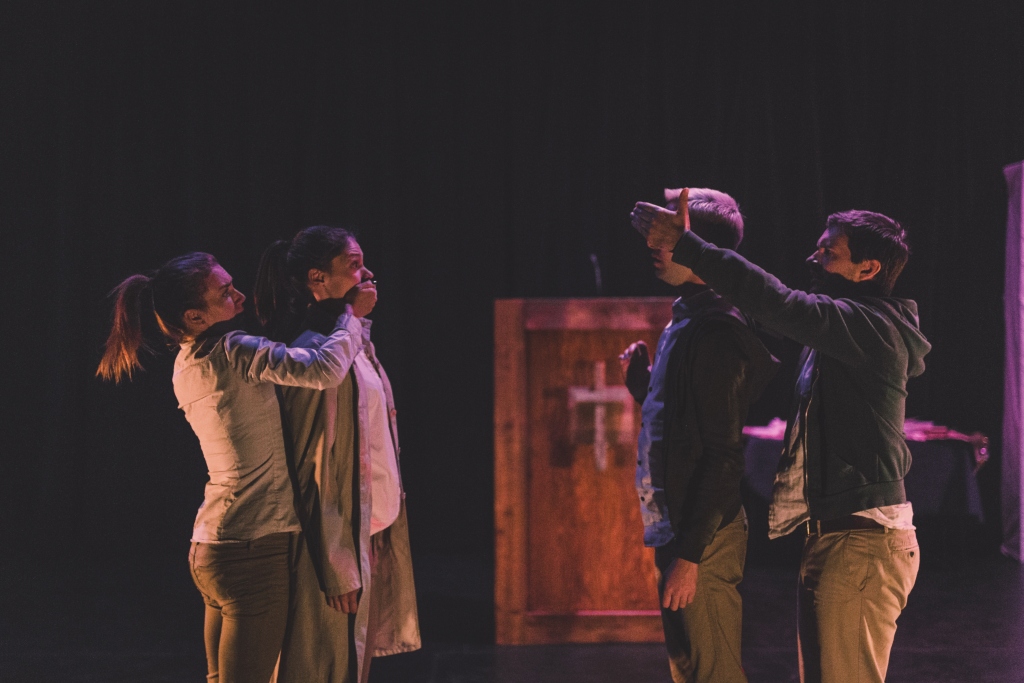Paving the Way for Change in Our Churches
One of the challenges of making socially relevant, “justice-seeking” theatre is that it can sound like we are doctors hounding you to take your medicine. There is always the concern that no one really wants to take it, even though they know it’s good for them. What is even more difficult is the stubborn patient, who insists nothing is wrong and refuses to acknowledge the disease festering inside. These are a couple of the challenges we’ve faced when creating a play like #ChurchToo.
Commissioned by the Mennonite Church of Eastern Canada (MCEC) and produced by Theatre of the Beat, #ChurchToo consists of seven playlets connected by the theme of sexual misconduct in the Church. Inspired by events happening all too often in various church communities, the MCEC invested in the play as a proactive way to educate congregants and inspire conversation about this taboo topic. The play opened to positive responses in Kitchener, ON in September 2018 and has been touring across Western Canada where it sparks urgent conversations.
According to Stats Canada, one in three women will experience some form of sexual violence in their lifetime. Thirty-nine percent of Canadian adult women reported having had at least one experience of sexual assault since the age of sixteen. Only one in three Canadians understand what sexual consent means.
When Johnny Wideman, artistic director of Theatre of the Beat, first reached out to me about the project I was enthusiastic but also cautious. As a cis-male with a complicated relationship with religion I wondered if I was the right choice. My father spent several years in a congregation that encouraged “speaking in tongues.” That was when I first started to see the power of persuasion prevalent in these systems. The question of my beliefs came up repeatedly while directing The Amish Project for my company, Green Light Arts. For this play about radical forgiveness we partnered with several Mennonite organizations with full disclosure that I am a humanist who believes we have the responsibility to be kind to one another and help build each other up. Sadly, people are suffering in silence due to violence and damage resulting from power dynamics woven into belief systems civilizations have been built on. If we can create theatre that challenges these power dynamics, I want to be a part of it.
In the May/June 2018 issue of Influence magazine, Beth Backes, Director of Credentialing & Pastoral Care for the Northwest Ministry Network in Washington DC stated that “sexual abuse in any form is fundamentally about power. Because church systems operate with some level of hierarchy, there is a high risk of leaders abusing that power over those they serve.” The scenarios she provides in the article surface throughout the playlets in #ChurchToo. Pastoral abuse, grooming, and manipulation—supported by a seemingly impenetrable wall of misogynistic dominance—course through the veins of this ninety-minute play. Women carry the burden of men’s actions for fear of ruining careers, destroying congregations, and the potential vitriol espoused by family, friends, and complete strangers. Victim-blaming is as old as the Bible itself. In John 8:4, after a couple is caught in the act of adultery, it is only the woman who is sentenced to stoning. Systems of oppression and imbalance between men and women have been built, reinforced, and codified through some of our primary foundations of faith. Recognizing gender bias, calling it out for what it is, is a necessary first step towards change.

Photo of Meghan Fowler and Lindsey Middleton by Saul Tahuite
While Christians believe God created men and women to be equal in value and dignity there are many verses that clearly reveal the cultural bias of the time, which persists even now, against women. Compared to men, there are few examples of female role models or women revered as heroes. Instead they are more likely to be treated as property or taught to be silent and not allowed to hold authority over men. Whether intentional or not, women are transformed into objects of desire and pleasure to be consumed, used, and discarded by men.
When Wideman was originally discussing the multiple play concept with the MCEC he thought it might be an interesting spin to have audiences choose what playlets they’d see on any given night. They would vote based on a written description of each playlet or the performers would summarize each piece at the top of the performance. While it would have added an interesting element, we quickly realized there is one playlet that may never be selected due to its content.
Jonathan Brower’s play Good Hands opens the conversation up to examine how the Church handles homosexuality. The playlet focuses on Nathan, a man forced to confront years of self-hatred and denial of his feelings, in the middle of his son’s thirteenth birthday. While Nathan and his husband are happily married, he grew up being told by his family and congregation that being gay meant you were a pedophile and that you cannot be trusted to do anything more within your church than janitorial services.
This is a very personal story, as Brower’s own experiences with conversion therapy influenced the play. We have had to turn down presentations when churches are only willing to bring us if we don’t include that one. True story—we had a church in BC basically tell us it is a beautiful series of plays but that it was too bad we ruined it with Good Hands (only not in such nice words). We stand by our decision. It is a play that focuses on the abuse of power wielded by specific denominations and congregations against the LGBTQ+ community. Nathan is made to feel hatred for himself because of something outside his control. No one should have to go through that.

Photo of Robert Murphy and Brendan Kinnon by Saul Tahuite
We feel this content is too important to leave for chance to determine if audiences see it. There may never be another opportunity for people from some of the more rural areas of Western Canada—heck even the major centres—to be exposed to this character’s journey and the new insights the audience can glean from the piece. Sometimes you have to stand up for what you believe in. Change takes time. Patience. Hopefully word reaches those churches and they realize it is important to create space for everyone’s stories, not just the ones that we’re immediately comfortable with.
Maybe you’re thinking, “Matt, it sounds like you are only presenting one side of the story!” Well, in some ways we could be guilty of that. Mainly because the opposite side is the dominant narrative permeating so much of contemporary culture. But to be fair, Megan Piercey Monafu’s piece Led Astray cleverly shows the complexity of trying to unpack “The Good Book”.
The play focuses on Miranda and Bob. Bob is a minister who has delivered a sermon about King Solomon. Miranda insists there should be more context around how King Solomon got his wives. That this revered figure would take wives as spoils of war and that we cannot gloss over the actual reality of these circumstances. She insists that in addition to being a lot of great things, King Solomon was also a rapist.
While Bob appreciates parts of her opinion he ultimately feels his hands are tied. It is not up to him to interpret the Bible or add context. Miranda, of course, thinks this is ridiculous considering they treat everything as factual. She insists Bob present all the facts, not just the ones he is most comfortable with. It is the most slice-of-life piece of the evening. She makes sandwiches while he eats chips throughout the debate. They could be any of our audience members sorting through their lives.
We want something, it costs something
This is where the show opens up and transcends non-secular audiences. This picking and choosing is rampant throughout our lives with each decision we make. It is almost impossible to make a medium sized-decision that doesn’t impact someone else’s life. Sweatshops, polluted water, climate change, factory farming, slavery, kids separated from their parents, cis and trans women/non-binary people being assaulted. It is all connected to a balancing act. We want something, it costs something.
If we believe something so thoroughly, we’ll keep hammering it into our narrative until we embody it. If that narrative supports an imbalance of power that ultimately results in certain people being treated without dignity and subjected to the whims of men, then I think it’s time we stop telling ourselves those same narratives. Let’s take some new medicine and get out of the cave. Start living life, fully. In a way where men aren’t alone at the centre of the universe right beside God.
Renowned philosopher Joseph Campbell suggests, “If you want to change the world, you have to change the metaphor.” To do this adequately you need to first unpack the metaphor. That is what we’re attempting to do through #ChurchToo and something many of us are wrestling with as our world becomes more polarized each day. We are all incredibly fortunate that the MCEC took the risk to take on these themes and that they trusted us with these stories.









Comments